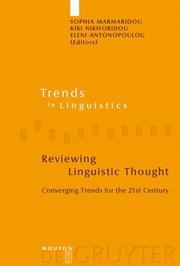| Listing 1 - 8 of 8 |
Sort by
|
Book
ISBN: 9789027256508 9027256500 Year: 2014 Volume: 245 Publisher: Amsterdam: John Benjamins,
Abstract | Keywords | Export | Availability | Bookmark
 Loading...
Loading...Choose an application
- Reference Manager
- EndNote
- RefWorks (Direct export to RefWorks)
Psycholinguistics --- Pragmatics --- Communicative competence --- Speech acts (Linguistics) --- Relevance --- Cognitive grammar --- Language and languages --- Philosophy

ISBN: 9027251053 158811032X 9786612161896 128216189X 9027297436 9789027297433 9781588110329 9789027251053 9781282161894 Year: 2001 Volume: 86 Publisher: Amsterdam ; Philadelphia : J. Benjamins,
Abstract | Keywords | Export | Availability | Bookmark
 Loading...
Loading...Choose an application
- Reference Manager
- EndNote
- RefWorks (Direct export to RefWorks)
This book uses Sperber and Wilson's Relevance Theory to show how evidential expressions can be analysed in a unified semantic/pragmatic framework. The first part surveys general linguistic work on evidentials, presents speech-act theory and examines Grice's theory of meaning and communication with emphasis on three main issues: for linguistically encoded evidentials, are they truth-conditional or non-truth-conditional, and do they contribute to explicit or implicit communication? For pragmatically inferred evidentials, is there a pragmatic framework in which they can be adequately accounted for? The second part examines those assumptions of Relevance theory that bear on the study of evidentials, offers an account of pragmatically inferred evidentials and introduces three distinctions relevant to the issues discussed in this book: between explicit and implicit communication, truth-conditional and non-truth-conditional meaning, and conceptual and procedural meaning. These distinctions are applied to a variety of linguistically encoded evidentials, including sentence adverbials, parenthetical constructions and hearsay particles. This book offers convincing evidence that not all evidentials behave similarly with respect to the above distinctions and offers an explanation for why this is so.
Semantics --- Pragmatics --- Speech acts (Linguistics) --- Grammar, Comparative and general --- Relevance --- Formal semantics --- Semasiology --- Semiology (Semantics) --- Comparative linguistics --- Information theory --- Language and languages --- Lexicology --- Meaning (Psychology) --- Pertinence --- Relevancy --- Meaning (Philosophy) --- Comparative grammar --- Grammar --- Grammar, Philosophical --- Grammar, Universal --- Philosophical grammar --- Linguistics --- Philology --- Illocutionary acts (Linguistics) --- Speech act theory (Linguistics) --- Speech events (Linguistics) --- Semantics (Philosophy) --- Speech --- Pragmalinguistics --- General semantics --- Logic, Symbolic and mathematical --- Grammar, Comparative --- Philosophy --- Lexicology. Semantics --- Evidentials (Linguistics). --- Grammar, Comparative and general. --- Pragmatics. --- Relevance. --- Speech acts (Linguistics). --- Evidentials (Linguistics) --- Sémantique --- Evidentialité --- Pragmatique --- Actes de parole --- Grammaire comparée et générale --- Evidentiality (Linguistics) --- Modality (Linguistics) --- Semantics. --- LANGUAGE ARTS & DISCIPLINES --- Linguistics / Semantics
Book
ISBN: 9027270376 9789027270375 1306770971 9781306770972 9789027256508 9027256500 Year: 2014 Publisher: Amsterdam, Netherlands ; Philadelphia, Pennsylvania : John Benjamins Publishing Company,
Abstract | Keywords | Export | Availability | Bookmark
 Loading...
Loading...Choose an application
- Reference Manager
- EndNote
- RefWorks (Direct export to RefWorks)
This book probes into under-researched issues in L2 pragmatics. Firstly, pragmatic competence, pragmatic awareness and metapragmatic awareness are re-defined and clearly distinguished on theoretical grounds. Secondly, pragmatic competence and its manifestations are evaluated on empirical grounds by distinct criteria and validated testing measures. More importantly, genuine pragmatic inference is elicited in contexts of online interpretation where figurative speech plays a central role. Genre-specific discourse which occurs in editorials and news reports serves as a natural testbe
Communicative competence. --- Pragmatics. --- Speech acts (Linguistics) --- Relevance. --- Pertinence --- Relevancy --- Meaning (Philosophy) --- Meaning (Psychology) --- Illocutionary acts (Linguistics) --- Speech act theory (Linguistics) --- Speech events (Linguistics) --- Language and languages --- Linguistics --- Speech --- Pragmalinguistics --- General semantics --- Logic, Symbolic and mathematical --- Semantics (Philosophy) --- Competence, Communicative --- Communication --- Competence and performance (Linguistics) --- Psycholinguistics --- Philosophy --- Communicative competence --- Pragmatics --- Relevance --- Cognitive grammar --- Language and languages - Philosophy
Book
Year: 1994 Publisher: London University of London
Abstract | Keywords | Export | Availability | Bookmark
 Loading...
Loading...Choose an application
- Reference Manager
- EndNote
- RefWorks (Direct export to RefWorks)
Book
ISBN: 9783110431056 9783110431131 9783110439717 311043105X 3110439719 Year: 2020 Publisher: Berlin De Gruyter Mouton
Abstract | Keywords | Export | Availability | Bookmark
 Loading...
Loading...Choose an application
- Reference Manager
- EndNote
- RefWorks (Direct export to RefWorks)
This handbook provides a comprehensive and up-to-date survey of a wide range of developmental and clinical issues in pragmatics. Principally, the contributions to this volume deal with pragmatic competence in a native language, in a second or foreign language, and in a selection of language disorders. The topics which are covered explore questions of production and comprehension on the utterance and discourse level. Topics addressed concern the acquisition and learning, teaching and testing, assessment and treatment of various aspects of pragmatic ability, knowledge and use. These include, for example, the acquisition and development of speech acts, implicatures, irony, story-telling and interactional competence. Phenomena such as pragmatic awareness and pragmatic transfer are also addressed. The disorders considered include clinical conditions pertaining to children and to adults. Specifically, these are, among others, autism spectrum disorders, Down syndrome, and Alzheimer's disease.
E-books --- Pragmatics --- Psycholinguistics
Book
ISBN: 9789027259592 9789027209269 902720926X 9027259593 Year: 2021 Publisher: Amsterdam John Benjamins Publishing Company
Abstract | Keywords | Export | Availability | Bookmark
 Loading...
Loading...Choose an application
- Reference Manager
- EndNote
- RefWorks (Direct export to RefWorks)
"Despite the fact that they are often crucial to our understanding, the vague, ineffable elements of language use and communication have received much less attention from linguists than the more concrete, effable ones. This has left a range of important questions unanswered. How might we account for the communication of non-propositional phenomena such as moods, emotions and impressions? What type of cognitive response do these phenomena trigger, if not conceptual or propositional? Do creative metaphors and unknown words in second languages and other 'pointers' to 'conceptual regions' communicate concepts learned from language alone? How might the descriptive ineffability of interjections, free indirect speech etc. be accommodated within a theory of communication? What of those working on the aesthetics of artworks, music and literature? What can evolution tell us about ineffability? The papers in this volume address these fascinating questions head-on. They represent a range of different attempts to answer them and, in so doing, allow us to pose exciting new questions. The aim, to bring the ineffable firmly within the grasp of theoretical pragmatics"--
Mass communications --- Pragmatics --- Psycholinguistics --- Inference --- Cognitive grammar --- Reasoning --- Ampliative induction --- Induction, Ampliative --- Inference (Logic) --- General semantics --- Language and languages --- Logic, Symbolic and mathematical --- Semantics (Philosophy) --- Philosophy


ISBN: 9783110920826 9783110183641 Year: 2011 Publisher: Berlin ;; Boston De Gruyter Mouton
Abstract | Keywords | Export | Availability | Bookmark
 Loading...
Loading...Choose an application
- Reference Manager
- EndNote
- RefWorks (Direct export to RefWorks)
Digital

ISBN: 9783110431056 9783110431131 9783110439717 Year: 2020 Publisher: Berlin ;; Boston De Gruyter Mouton
Abstract | Keywords | Export | Availability | Bookmark
 Loading...
Loading...Choose an application
- Reference Manager
- EndNote
- RefWorks (Direct export to RefWorks)
| Listing 1 - 8 of 8 |
Sort by
|

 Search
Search Feedback
Feedback About UniCat
About UniCat  Help
Help News
News